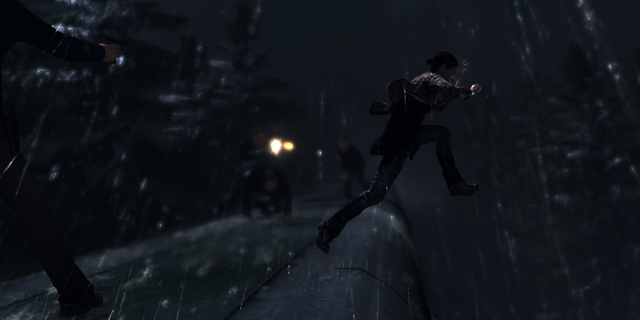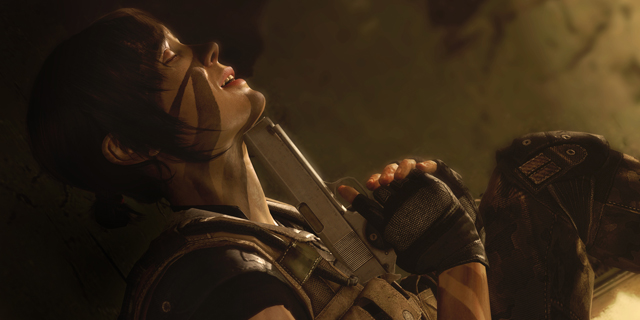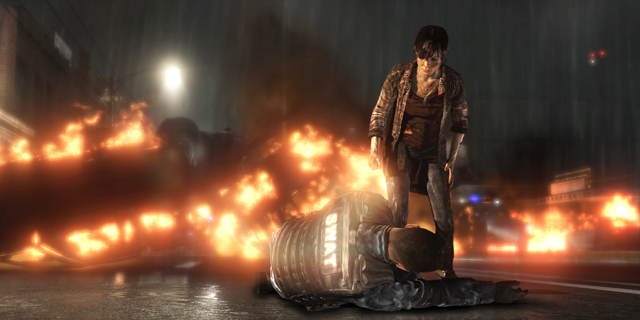
These days, it’s common to find games attempting to branch out with their storytelling even if it means sacrificing a more “traditional” gameplay experience as a result. It’s hard to deny the impact of these titles, even if some succeed more than others. Quantic Dream, the team behind 2010’s Heavy Rain, continues in this grand tradition to expand on the nature of the medium while also attempting to tell a more cinematic, impactful story.
Beyond: Two Souls, the team’s latest effort, demonstrates a clear understanding of how to push narrative to the forefront, but does so with uneven results.
Beyond follows Jodie Holmes, a young woman who is connected with a spirit named Aiden, through her life as she attempts to live with (and better understand) this entity she is attached to. The story jumps around from point to point in her life in a non-linear fashion, following her early days as she and Aiden are tested on their abilities, her time working with CIA and while she is on the run from the government. The ways in which these three major points in Jodie’s life are connected are slowly revealed as you play, but the way in which the narrative is presented leaves certain events muddled as a result.

The reason Heavy Rain worked so well, despite its flaws, is its ability to tell a (mostly) coherent story and allowed you to connect with the four main protagonists due to the nature of the story itself. Beyond does this at points, with a handful of undeniably brilliant and emotionally-charged moments, but its non-linear storytelling methods make those moments feel few and far between. You do connect with Jodie and the other characters on some level, but the game’s insistence on jumping around throughout her life makes it hard to form a bond with her and, as a result, makes her story feel unfocused.
This is by no means the fault of the actors. Ellen Page and Willem Dafoe (who plays Jodie’s close friend and mentor) both do amazing jobs with the material they are given, as does the rest of the cast. Unfortunately, the writing is far from the game’s strong suit, leaving you with two incredible actors giving it their all despite the weak script they have to work with. It’s far from terrible, as there are plenty of solid moments throughout Beyond’s story, but certain details about the plot are never fleshed out in a satisfying manner. Due to the jumbled storytelling method, character motivations (especially near the end) feel forced and unnatural.
During Jodie’s time working with the CIA, one of her friends, Ryan, is coming over her apartment for dinner. You are then left to clean up, get dressed and prepare dinner, making it obvious to you that this is meant to be a date. Due to the non-linear narrative, this romance literally comes out of nowhere, and is brought up again several times throughout the story, yet you are forced to just go with it. The outcome of the scene can be changed, yet the setup still feels oddly out of place with the rest of the game. You are never given time to see how these relationships are developed, due to the scope of the story and how it allows for you to experience Jodie’s life over the course of many years. It’s an unfortunate consequence of an otherwise-intriguing tale.

Beyond’s story may not deliver on the same level as Quantic Dream’s previous efforts, but the act of actually playing it remains oddly compelling. The game’s mechanics are very similar to Heavy Rain. As you walk around the various environments, you can interact with certain characters or objects. These interactions boil down to specific button presses or Sixaxis movements akin to quick-time events. While I can’t say it’s the most exciting gaming experience I’ve had, even doing mundane tasks feels satisfying when presented the way it is. Beyond never lingers on these slower moments for too long, yet they give you the most time to explore and learn things about Jodie herself, which is a welcome reprieve from the game’s more hectic segments.
The big change from Heavy Rain is how action sequences play out. Jodie can hold her own against anyone who is out to get her, meaning there are a good number of fight sequences. As you attack and defend, the game slows down and Jodie’s next action begins to show on the screen, allowing you to push the right analog stick in the direction of the action in time. Think of a less brutal version of Dragon’s Lair, in which you are specifically shown what you need to do, but it’s up to you to successfully execute it in a timely fashion. These sequences are surprisingly tense and exciting, even if the consequences of failing them are never as dire as they initially seem.
The other major difference between this and other Quantic Dream titles is being able to control the entity, Aiden. When controlling him, you are given the ability to activate items, knock things over and even possess people and use them to help you accomplish whatever it is you’re attempting to do. There are a select handful of stealth segments in the game where Aiden’s abilities are crucial, as you can use him to distract foes or take them out quietly while Jodie is able to pass through to her objective. Thankfully, controlling Aiden and using his abilities is enjoyable, even if his use is limited at times.
There is a lot to love about Beyond and its weird brand of interactive storytelling, and I appreciate its ambition, but it’s hard to ignore the game’s numerous narrative flaws. The controls, base mechanics and acting are all a step up from the studio’s previous titles, yet the writing and story never quite reach the same heights and often times fall completely flat. It manages to take two steps forward and three steps back, leaving you with a sometimes-exciting, often-forgettable experience.
Pros: Excellent acting, solid mechanics, brilliant moments sprinkled throughout
Cons: Muddled story and character motivations, weak writing



















